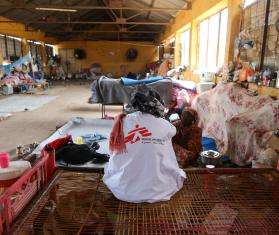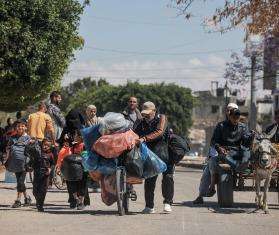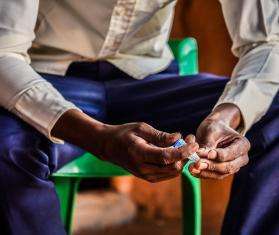A week after massive, violent inter-ethnic clashes erupted in the south of Kyrgyzstan, Doctors Without Borders/Médecins Sans Frontières (MSF) teams are providing medical care and assistance to victims on the ground. The medical humanitarian organization also plans to rapidly increase its efforts by dispatching more humanitarian workers to the field and flying in tons of medical and logistical material for the displaced.
Reaching Out to Victims in Osh and Jalalabad
“Our medical teams based in the cities of Osh and Jalalabad report there is still a high level of tension there and huge humanitarian needs,” says Alexandre Baillat, MSF’s Head of Mission in Kyrgyzstan. “On Wednesday, for instance, our Jalalabad team provided medical care to 40 wounded people stranded in one of the town’s districts.”
The main city hospitals are functioning well, but peripheral health structures need support. MSF delivered drugs, medical items, and materials for dressing wounds to the main regional hospital and donated drugs and first aid kits to Jalalabad’s Family Medicine Center. “We are also concentrating our efforts on reaching out to communities in the city that are without access to health care or living in dire conditions after they had to flee their homes,” says Baillat. “Many of the wounded are afraid to move around or to go to a clinic.”
On Friday, June 18, an MSF team accessed a village near the Uzbek border where 8,000 people have sought refuge. The teams report that these people “need almost everything—blankets, buckets, cooking sets, tents” and more. This coming Saturday, June 19, an MSF truck will drive from the capital, Bishkek, to Jalalabad with some of these goods, along with hygiene and medical supplies, for 500 families. Additionally, MSF plans to access another village where 6,000 displaced people—a majority of them reportedly women and children—are said to have settled.
Refugees in Uzbekistan
In addition to tens of thousands of families displaced outside Osh and Jalalabad, at least 75,000 have sought refuge on the Uzbekistan side of the border. MSF has a team based in the Uzbek region of Andijan, where many of the displaced have temporarily settled in camps set up by local authorities.
“The wounded are given proper medical care by local doctors, but there is a strong need for psychological support as a lot of the refugees have either experienced or witnessed acts of violence,” says Alex Telnov, MSF’s medical coordinator in Uzbekistan. “The refugees experienced targeted killings, violence against their family members and targeted destruction of their houses. The authorities have deployed five mobile groups of psychologists/counselors, and an MSF mental health specialist has started training this staff in the management of post-traumatic stress.”
Along with other international organizations, MSF is assessing the needs of the displaced population in Uzbekistan. MSF has distributed two truck loads of mattresses, sheets, blankets, and hygiene utensils in Andijan and will soon dispatch more trucks to meet the needs of people who have yet to receive help. A team of water and sanitation expats will arrive next week to assist the government within refugee camps.
Human Resources and Material Coming from Europe
MSF has worked in Kyrgyzstan since 2006, running a tuberculosis program in the Kyrgyz penitentiary system. To augment staff already in the country, MSF is flying in 15 additional humanitarian workers this week, including coordinators, surgeons, nurses, logisticians, and water and sanitation specialists. A full charter plane carrying approximately 30 tons of medical and surgical material, drugs, an ambulance, and water, sanitation and shelter materials is also expected to fly from Vatry in France to Osh this weekend.
Doctors Without Borders/Médecins Sans Frontières (MSF) has been running a tuberculosis programme in the Kyrgyz penitentiary system since 2006. In Karakalpakstan, an autonomous republic within Uzbekistan, MSF is treating patients with drug resistant forms of tuberculosis in Nukus and Chimbay and has recently expanded activities into Karauziak and Tahtakupir districts. MSF has been working in Uzbekistan since 1997.




